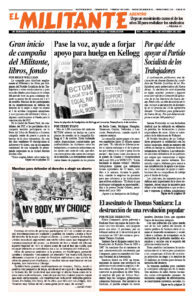Over 300 participants attended a Sept. 24 meeting in Iraq that called on Baghdad to establish full diplomatic relations with the state of Israel. Because Iraqi law bans calling for normalization with Israel, the meeting took place in Erbil, the capital of the semi-autonomous Kurdish Regional Government in northern Iraq. The government in Baghdad denounced the meeting.
“We demand full diplomatic relations with the State of Israel,” Wisam al-Hardan told the conference, “and a new policy of normalization based on people-to-people relations with the citizens of that country.” He commanded Sunni militias in the fight against al-Qaeda in 2005 and is a leader of the Sons of Iraq Awakening movement.
Among the participants from six Iraqi governorates were Sunni and Shiite leaders and former Iraqi military commanders. There were also young activists who have been involved in recent protests against Iranian interference in Iraq and the Iraqi government’s anti-working-class policies. Iranian-backed militias and government forces have attacked the protests and assassinated protest leaders.
The meeting, organized by the Center for Peace Communications, a New York-based group that pushes for improving ties between Israel and Arab countries, marked growing support in the region to recognize the Jewish state.
In an opinion piece in the Wall Street Journal run the same day as the conference, al-Hardan wrote that “we oppose all extremists, whether Sunni jihadists or Iran-backed Shiite militias.” The Iraqi people, he said, need to work together in “a spirit of partnership across ethnic and sectarian lines.”
Al-Hardan noted the tragedy of the “mass exodus and dispossession of the majority of our Iraqi Jewish population, a community with 2,600 years of history, in the mid-20th century.” A 1941 pogrom and then stepped-up persecution after the formation of the state of Israel in 1948, spurred almost the entire Jewish population of Iraq to flee. Before the assaults, one-third of the population of Baghdad was Jewish.
The Sunni leader said that the Iraqi government should follow in the steps of the governments of the United Arab Emirates, Bahrain, Kosova, Sudan and Morocco that recently cemented diplomatic and economic ties with Israel. These agreements, known as the “Abraham Accords,” were brokered by the administration of President Donald Trump during his last year in office.
Sahar al-Ta’i, a high-ranking official of the Iraqi Ministry of Culture, gave the closing speech. “Iraq today must change its policy,” she said. “For the sake of peace in the region, it has become imperative to recognize Israel as a friendly country.”
Like al-Hardan, she referred to the some half-million Israeli Jews of Iraqi descent. “Their eyes are still turned toward Iraq, like a mother longing for her children,” she said.
‘Don’t abandon Israelis, Palestinians’
Iraq “will not abandon the Israelis, just as it will not abandon the Palestinians,” al-Ta’i said to applause from the crowd. She said that peace and establishing relations with the Israeli government was in the interest of the Palestinian people, because it would enable them “to build state institutions and to provide opportunity for a better life for future generations.”
Iraqi Prime Minister Mustafa al-Kadhimi issued a statement the next day calling the conference an “illegal meeting.” He ordered the arrest of al-Ta’i, al-Harden and Iraqi politician Mithal al-Alousi, who has long advocated for normalization and previously visited Israel, even though he says he wasn’t at the meeting. The arrest warrants have yet to be carried out.
The Iraqi education ministry fired Mahdi Ali Abdullah Al Kabalan, the dean of the Department of Elementary Education at Tal Afar University, for attending the conference.
The Iraqi government justified the repressive measures as a defense of the right of the Palestinian people to an “independent state.” In fact, the Iraqi government is defending the interests of the dominant wing of the Iraqi ruling class and its ties to the reactionary capitalist regime in Iran.
To avoid a clash with Baghdad, the Kurdish Regional Government claimed it did not know the meeting was taking place and that it was done “without our approval.” The KRG has many informal ties with the Israeli government, which has bought oil from the KRG and backed the 2017 referendum it organized that called for independence from Iraq.
Some Tehran-backed militias in Iraq have made death threats against conference participants. Sons of Iraq removed al-Harden from his post in the group.
Under this pressure, al-Harden now claims that he didn’t realize the speech he was reading called for diplomatic ties with Israel. He says he just wanted to promote ties with Iraq’s Jewish diaspora.
Whatever the outcome of this particular initiative, it’s a telling reflection of the growing sentiment by working people and others in the Middle East for an end to sectarian fighting and recognition of the state of Israel and of its right to exist.

